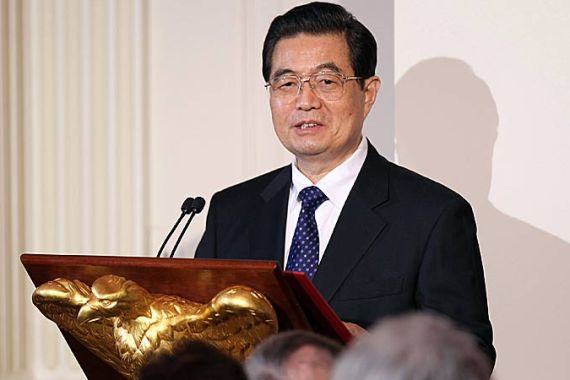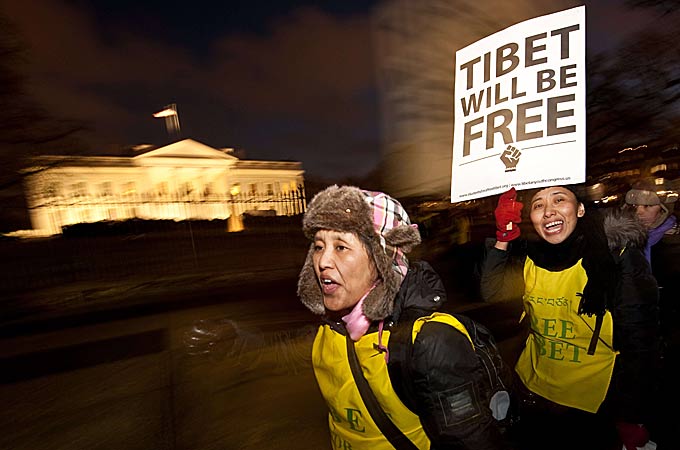China’s Hu upbeat on global economy
President Hu Jintao tells US business leaders world is recovering from financial crisis but faces destabilising factors.

 |
| Hu has been met with criticism of China’s human rights record during his vist to Washington [AFP] |
Hu Jintao, the Chinese president, has told business leaders and senior officials in the US that the world is recovering from the global financial crisis, but that it is a difficult process fraught with “unstabilising factors”.
Addressing the US-China Business Council in Washington on Thursday, Hu said it was important for both China and the US to work together to help achieve a “full recovery of the world economy”.
The president, who is seeking to persuade Americans that his country is an economic partner and not a threat to US interests, said co-operation between the two nations in the Asia-Pacific area is crucial.
“Our two countries have never enjoyed such broad common interests and shouldered such broad common responsibilities as they do today,” Hu said.
“We will unwaveringly take the path of peaceful development.”
No ‘military threat’
Hu, who is on a four-day visit to the US, made the speech a day after hearing complaints about Beijing’s human rights and other policies from some of China’s sharpest critics in Congress.
The president said that his country had no interest in engaging in an arms race but also warned Washington to respect Beijing’s sovereignty over Taiwan and Tibet.
He said that Taiwan and Tibet “concern China’s sovereignty and territorial integrity and they represent China’s core interests”.
“A review of the history of our relations tells us that US-China relations will enjoy smooth and steady growth when the two countries handle well issues involving each other’s major interests,” Hu said.
“Otherwise our relations will suffer constant trouble or even tension.”
Patty Culhane, Al Jazeera’s correspondent in Washington, DC, reported that US CEOs have several concerns regarding China, not least of which is its currency.
“US officials believe it is deliberately undervalued, putting US companies at a disadvantage. But they have an even bigger complaint: they say that China is the fastest growing economy, they have a burgeoning middle class, and these companies want access to that market.
“These companies feel as if they are being discriminated against by China in favour of Chinese companies.”
After the visit, Culhane reported that US business leaders “like what they are hearing from President Hu, but now they’re saying this is talk, let’s see some action”.
Human rights on agenda
On Wednesday, at a joint news conference with Hu, Barack Obama, the US president, had urged China to engage in talks with the Dalai Lama, Tibet’s exiled spiritual leader, although he reaffirmed the US view that the Himalayan territory is part of China.
Hu acknowledged that China still needed to do “a lot” with regard to its human rights.
The US and its allies, particularly Japan, have repeatedly voiced concern about China’s double-digit growth in military spending.
China reportedly tested a stealth fighter this month just as Robert Gates, the US defence secretary, was visiting the country.
Dismissing the concerns, Hu said: “We do not engage in arms races, or pose a military threat to any country. China will never seek hegemony or pursue an expansionist policy.”